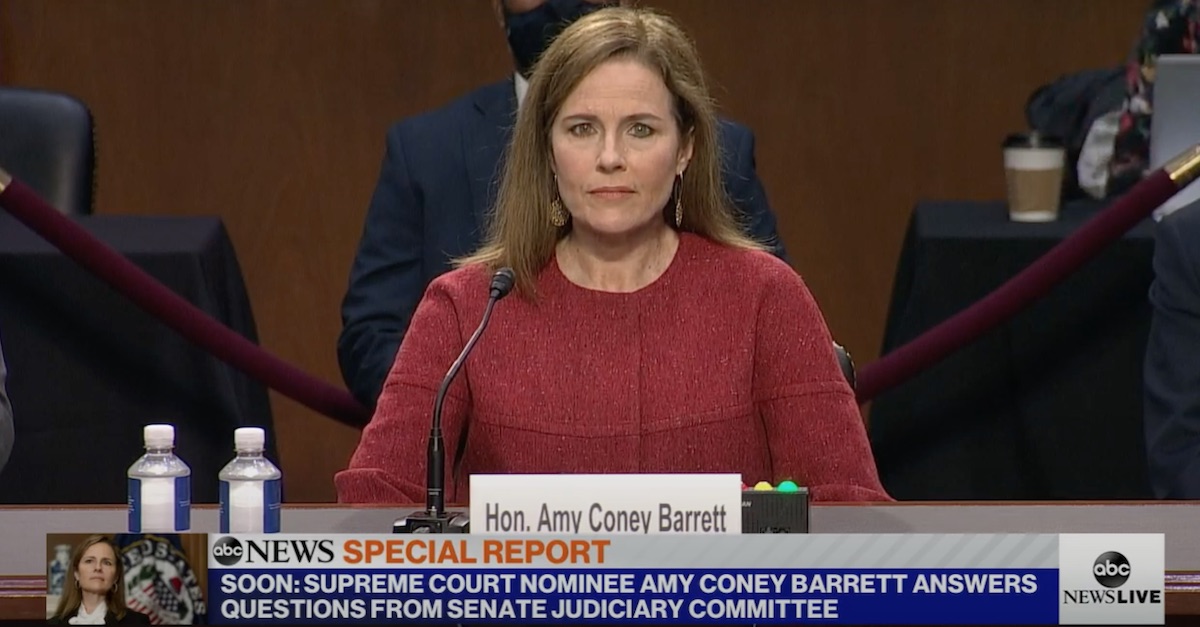
A former federal judge who was frequently mentioned as being on then-President George W. Bush’s shortlist for potential U.S. Supreme Court nominees said that, if confirmed, to the high court, Judge Amy Coney Barrett will have to recuse herself from any cases relating to the 2020 presidential election.
When the topic came up during last week’s confirmation hearings, Barrett side-stepped the question of recusal, calling it a “legal issue” and citing to 28 USC §455 which states that “[a]ny justice, judge, or magistrate judge of the United States shall disqualify himself in any proceeding in which his impartiality might reasonably be questioned.” She ultimately concluded that whether she would take part in such a decision was not something she could answer “in the abstract.”
President Donald Trump and Senate Republicans have taken a more extreme position, repeatedly claiming that a ninth justice could be critical in having the court (not voters) ultimately decide the 2020 election. Some legal ethics experts believe Barrett should not decide a potential case of crucial importance to President Trump’s reelection; others believe Barrett has a “duty” to participate fully despite the circumstances of her appointment.
In a Saturday op-ed in The Washington Post, J. Michael Luttig, who served on the U.S. Court of Appeals for the Fourth Circuit from 1991 to 2006, wrote that a little-known 2009 Supreme Court case almost certainly requires Judge Barrett to recuse herself from any case involving Trump’s re-election.
“But as Barrett must already understand, her decision was made exponentially more difficult by Caperton v. A.T. Massey Coal Co., an inartful and mischievous 5-to-4 case decided more than a decade ago by the court she will soon join,” Luttig wrote, adding that the case “would seem to apply squarely” to her recusal decision.
The case involved the CEO of a coal company who donated $3 million to support the election of a Supreme Court of Appeals justice in West Virginia. After getting elected, that justice participated in reviewing a state court decision finding the coal company liable for $50 million in damages, casting the deciding vote to reverse the decision and dismiss the case. The justice’s failure to recuse himself was contested as presenting a “constitutionally unacceptable appearance of impropriety” under the Due Process Clause of the Fourteenth Amendment.
In a majority opinion penned by then-Justice Anthony Kennedy, the High Court reasoned that the mere appearance of bias was enough to require the justice’s recusal from the case.
“Based on its appraisal of the ‘psychological tendencies and human weakness’ of all of us, the majority concluded that the campaign spending had ‘significant[ly] and disproportionate[ly]’ influenced the judge’s election while the case was pending or imminent, resulting in a perceived serious risk that the judge was biased in favor of his contributor. ‘Just as no man is allowed to be a judge in his own cause, similar fears of bias can arise when — without the other parties’ consent — a man chooses the judge in his own cause,’” Luttig wrote. “The majority’s evident concern was over an influence — financial or not — that would be so overwhelming that a judge’s psychological temptations and human weaknesses would necessarily yield to that influence, whether the judge recognized it.”
Applying the case to Barrett’s circumstances, Luttig concluded that the decision appeared to apply with “proverbial vengeance.”
“Among these pressures are her nomination, due to Justice Ruth Bader Ginsburg’s death, little more than a month before the election, the unavoidable fact that Barrett would be deciding the political fate of the president who nominated her only weeks ago, and President Trump’s ill-timed calls for Barrett’s swift confirmation so that she can be seated in time to decide the election cases,” he wrote. “These bludgeoning pressures alone are at once singular and unprecedented, unsurpassed and quite possibly unsurpassable in their magnitude. By comparison, the pressures believed put on the West Virginia judge in Caperton pale.”
Luttig also pointed out that Barrett’s former boss and mentor, the late Justice Antonin Scalia dissented from the decision, rebuking the majority for “constitutionalizing the judge’s recusal decision ‘in a manner ungoverned by any discernable rule.’”
[image via ABC News sceengrab]